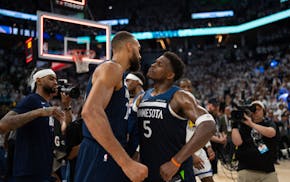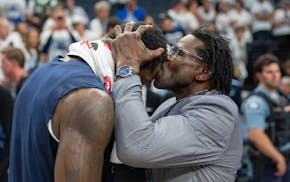As a player, Pete Rose, with his 4,256 career hits, three batting titles and record 14,053 at bats, is more than Hall of Fame-worthy. That's why the man was nicknamed the Hit King.
The Hit King also was a rule-breaker. Notably baseball's Rule 21, which prohibits gambling on games. All you have to do is look up the Dowd Report to understand the extent of the Hit King's behavior.
Rose never had his case placed in front of voters. That changed last week when Rose, Shoeless Joe Jackson and 15 other deceased players and officials were removed from baseball's permanently ineligible list. And I'm glad it changed.
Rose's case allows the Hall of Fame's character clause to be put to the ultimate test, something that could change attitudes about Roger Clemens, Barry Bonds and other former players who were linked to the use of performance-enhancing drugs.
It also gives the legion of fans who believe the Hit King has been unfairly cast aside all these years some hope that justice will prevail.
Following a recent meeting with President Donald Trump, Major League Baseball Commissioner Rob Manfred lifted Rose's permanent ban. It's amazing how MLB commissioners react to trips to Washington, the place where their antitrust exemption was granted.
Rose died in September at 83, and it is a shame his case has been revived when he's not around. The Baseball Writers Association of America should have been allowed to vote yes or no on Rose while he was still alive.
That door to Cooperstown, N.Y., has now cracked open.
Beginning with the Class of 1945, the Hall of Fame stated that voters should consider candidates "on the basis of playing ability, sportsmanship, character, their contribution to the teams on which they played and to baseball in general." There's the character clause. How much that clause should factor in decision-making has been under stress because of the PED era.
I believe there are players already in the Hall of Fame who used PEDs during their careers. Moreover, I think baseball's Hall of Fame, or the other pro sports Hall of Fames, are far from all-saints clubs.
Former Commissioner Bud Selig was in charge during an era in which players' muscles expanded, batted balls traveled 475 feet, relievers could pitch four consecutive nights and legendary players from previous eras had their records obliterated. Owners, general managers, trainers, coaches and teammates looked the other way as stats, and salaries, expanded.
I believe there were many instances of dirty pitchers throwing to dirty hitters during that time. When Selig was a first-ballot Hall of Fame electee in 2017, I wasn't the only voter who wondered, "Why am I even trying to do the right thing here?" when he's rewarded after overseeing those scandalous times.
Now here comes Rose, a confirmed rule-breaker.
Rose is far from a slam dunk to get into the Hall of Fame. First, he has to be placed on the Classic Baseball Era committee's ballot that will be voted on in December 2027. That won't be too big of a hurdle. After that, his case will be dug into, again.
You can look at recent ballots for an idea of what the attitudes are about candidates who fall into the crosshairs of the character clause. Let's review the 2022 vote by the 16-member Contemporary Baseball Era committee.
The committee comprises a handful of current Hall of Famers — Jack Morris was one that year; a handful of league executives — former Twins President Dave St. Peter was one that year; and a few veteran media members — I was one that year.
A candidate must be included on 12 of the 16 ballots to be elected. I'm restricted from discussing the content of the deliberations, but look at the results.
Fred McGriff was unanimously elected. Don Mattingly was second with eight votes. Barry Bonds and Roger Clemens didn't even get four votes. Only three of the 16 voters were media members, revealing the level of skepticism among former players and league executives about Bonds, Clemens and other polarizing cases.
The case of the Hit King will be under tougher scrutiny than that of 400 BBWAA voters. Rose bet on baseball games while managing the Reds from 1985 to '87. There's evidence he bet on games as a player. He played the horses. He dealt with bookies and unsavory characters. He liked the action. We all have our vices. He was obsessed with his and allowed it to invade his profession.
Even after agreeing to a lifetime ban in 1989, the Hit King denied, denied and denied that he bet on baseball, until 2000, when he admitted to it in a private meeting with Selig. Then he admitted it publicly in 2004 in an effort to sell books. All of that likely will be rehashed.
He fouled up chances, time and time again, to get back in baseball's good graces.
It's good that Rose, posthumously, has a path to Cooperstown — and not just on Main Street, where he would sit at a booth a few hundred yards from the museum's entrance, selling his autograph during Hall of Fame week.
If he is voted in by the Classic Baseball Era committee, which covers players before 1980, it would lead to more support for Bonds, Clemens and other players linked to PED use.
If Rose can't get past that vote, then the standards set by the Hall of Fame will be proven impenetrable and not changeable for anyone. Even the Hit King.
That 2027 vote can't come soon enough. Let's settle this once and for all.

Neal: Timberwolves players find solutions to all their problems right nearby — in their teammates

Neal: A Messi goal, a Loons victory. What more could we ask? Well, there's one thing

Neal: Despite a hiccup, Julius Randle sparked the Timberwolves to victory

